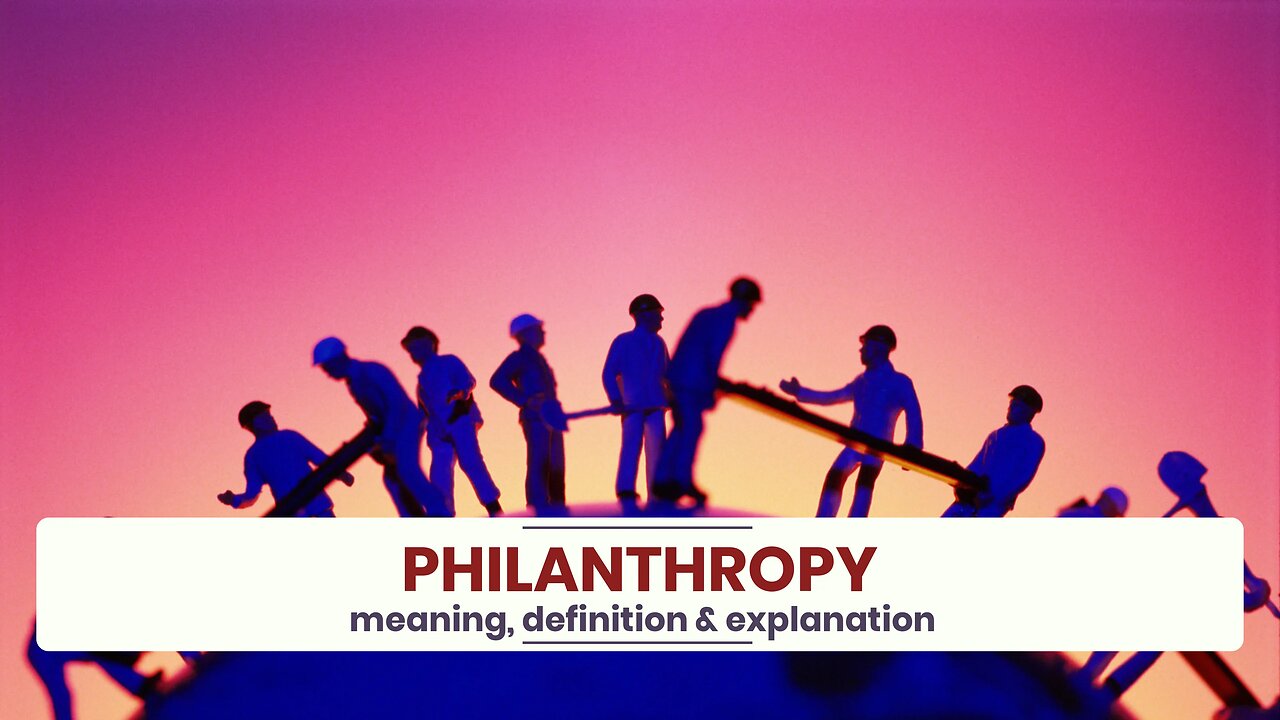Premium Only Content

What is PHILANTHROPY?
✪✪✪✪✪
http://www.theaudiopedia.com
✪✪✪✪✪
What does PHILANTHROPY mean? PHILANTHROPY meaning - PHILANTHROPY definition - PHILANTHROPY explanation. What is the meaning of PHILANTHROPY? What is the definition of PHILANTHROPY? What does PHILANTHROPY stand for? What is PHILANTHROPY meaning? What is PHILANTHROPY definition?
Philanthropy means etymologically, the love of humanity, in the sense of caring, nourishing, developing, and enhancing what it means to be human. In this meaning, it involves both the benefactor in their identifying and exercising their values, and the beneficiary in their receipt and benefit from the service or goods provided. A conventional modern definition is "private initiatives, for public good, focusing on quality of life," which combines an original humanistic tradition with a social scientific aspect developed in the 20th century. The definition also serves to contrast philanthropy with business endeavors, which are private initiatives for private good, e.g., focusing on material gain, and with government endeavors, which are public initiatives for public good, e.g., focusing on provision of public services. A person who practices philanthropy is called a philanthropist.
Philanthropy has distinguishing features from charity; not all charity is philanthropy, or vice versa, though there is a recognized degree of overlap in practice. A difference commonly cited is that charity aims to relieve the pain of a particular social problem, whereas philanthropy attempts to address the root cause of the problem—the difference between the proverbial gift of a fish to a hungry person, versus teaching them how to fish.
The literal, classical definitions and understandings of the term philanthropy derive from its origins in the Greek ???????????, which combines the word ????? (philos) for "loving" and ???????? (anthropos) for "human being" (see below).
The most conventional modern definition is "private initiatives, for public good, focusing on quality of life". This combines the social scientific aspect developed in the century with the original humanistic tradition, and serves to contrast philanthropy with business (private initiatives for private good, focusing on material prosperity) and government (public initiatives for public good, focusing on law and order). These distinctions have been analyzed by Olivier Zunz, and others.
Instances of philanthropy commonly overlap with instances of charity, though not all charity is philanthropy, or vice versa. The difference commonly cited is that charity relieves the pains of social problems, whereas philanthropy attempts to solve those problems at their root causes (the difference between giving a hungry person a fish, and teaching them how to fish).
-
 1:52
1:52
The Audiopedia
9 months agoWhat is EXECUTIVE DIRECTOR?
531 -
 32:55
32:55
The Connect: With Johnny Mitchell
1 day ago $3.40 earnedInside America's LARGEST Pot Trafficking Gang: How Florida Fishermen Became #1 Most Wanted Cartel
38.3K8 -
 2:05:15
2:05:15
Right Side Broadcasting Network
12 hours agoLIVE REPLAY: President Trump Attends UFC Fight 314 - 4/12/25
107K12 -
 2:07:42
2:07:42
BlackDiamondGunsandGear
10 hours agoWho’s in Town for This Stream?
57.7K4 -
 1:24:56
1:24:56
Quite Frankly
20 hours ago"Wild Tales: Crazy Story Hotline" | The Brothers Ep. 1
84.9K15 -
 12:37
12:37
Tundra Tactical
17 hours ago $6.07 earned🚫🚫 Biden Era GUN CONTROL Gone!!!! 🚫🚫
65.3K20 -
 1:00:09
1:00:09
Motherland Casino
9 hours ago $6.39 earnedCynthia X Mia
58.7K5 -
 5:32:47
5:32:47
BubbaSZN
16 hours ago🔴 LIVE - BUBBA PLAYS WARZONE SEASON 3
41.4K1 -
 2:29:26
2:29:26
Mally_Mouse
16 hours agoSaturday Shenanigans!! - Let's Play: REPO
58.4K14 -
 8:07
8:07
WhaddoYouMeme
1 day ago $5.02 earnedBut His Response Left Them Speechless!
44.4K55